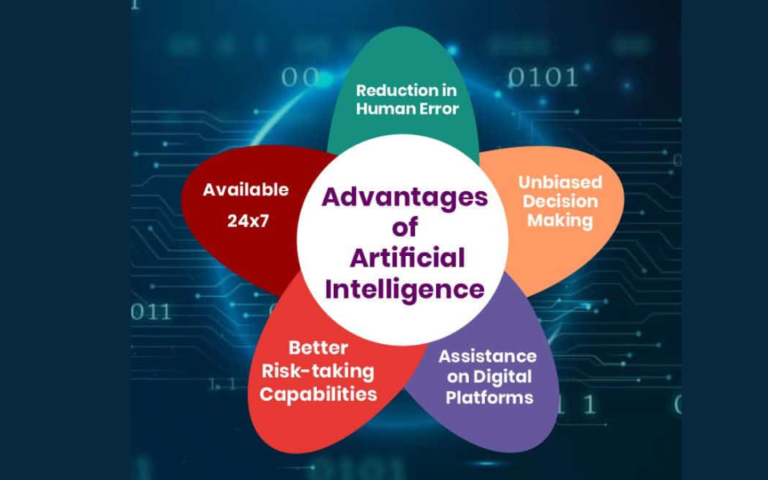How To Use AI For Good

AI, or artificial intelligence, has become a significant part of our lives, revolutionizing industries and transforming the way we interact with technology. But have you ever wondered how AI can be used for good? In this article, you will discover the potential of AI in making a positive impact on various aspects of our society. From healthcare advancements to environmental conservation and social progress, AI has the power to bring about positive change. So, let’s explore how we can harness the potential of AI for the greater good and create a brighter future for all.

Ensuring Ethical Use of AI
Developing Clear Guidelines and Standards
When it comes to the ethical use of AI, it is essential to establish clear guidelines and standards. These guidelines will serve as a framework to ensure that AI systems are developed and implemented in a responsible and ethical manner. By defining what is acceptable and what is not, organizations can minimize the risks associated with AI and uphold ethical principles.
Training AI Systems to Identify Bias
One of the key challenges in AI development is the potential for bias. AI systems learn from data, and if the data used to train them is biased, the system itself may perpetuate that bias in its decision-making processes. Therefore, it is crucial to train AI systems to recognize and mitigate bias. By incorporating diverse and representative data sets during the training phase, developers can reduce the risk of biased outcomes and promote fairness and equality.
Ensuring Transparency and Accountability
Transparency and accountability are central to the ethical use of AI. Users and stakeholders should be able to understand and question the decisions made by AI systems. This requires transparency in the algorithmic processes and the ability to explain the reasoning behind AI-driven decisions. Additionally, organizations must be held accountable for the outcomes of their AI systems, which includes addressing any unintended consequences and making appropriate adjustments to ensure fairness and ethical practices.
Advancing Healthcare
Accelerating Drug Discovery and Development
AI has the potential to revolutionize the pharmaceutical industry by accelerating the drug discovery and development process. By analyzing vast amounts of medical and scientific data, AI algorithms can identify potential drug candidates, predict their efficacy, and optimize their formulation. This can significantly reduce the time and cost involved in bringing new drugs to market, ultimately benefiting patients and improving healthcare outcomes.
Improving Diagnosis and Treatment
AI technology can aid healthcare professionals in diagnosing diseases and developing personalized treatment plans. Machine learning algorithms can analyze patient data, including medical records, imaging scans, and genetic information, to identify patterns and predict disease progression. This can help doctors make more accurate and timely diagnoses, leading to more effective treatments and improved patient outcomes.
Enhancing Patient Care and Support
AI applications can improve patient care and support by providing personalized, real-time monitoring and interventions. For example, wearable devices equipped with AI algorithms can track vital signs, detect anomalies, and alert healthcare providers in case of emergencies. AI-powered chatbots can also offer 24/7 support, answering common patient queries and providing helpful information. These advancements not only enhance the quality of care but also increase patient satisfaction and engagement.
Improving Education
Personalizing Learning Experiences
AI can revolutionize the education sector by personalizing learning experiences for students. By analyzing individual learning styles, preferences, and strengths, AI algorithms can adapt educational content and delivery methods to suit each student’s needs. This customized approach can significantly enhance engagement and knowledge retention, leading to improved academic performance.
Automating Administrative Tasks
Educators often spend a significant amount of time on administrative tasks, such as grading papers and managing paperwork. AI can automate these routine tasks, freeing up teachers’ time to focus on more meaningful activities, such as lesson planning and providing individualized support to students. Automating administrative tasks also reduces the chances of human errors, ensuring accuracy and efficiency.
Enhancing Accessibility for All Students
AI technology can break down barriers to education by enhancing accessibility for students with disabilities or other learning challenges. For example, speech recognition and natural language processing algorithms can enable students with speech impairments to interact with educational resources using their voices. AI can also provide real-time captioning or translation services for students with hearing or language barriers, ensuring inclusivity and equal access to educational opportunities.

Fighting Climate Change
Monitoring and Predicting Environmental Changes
AI systems can play a crucial role in monitoring and predicting environmental changes. By analyzing vast amounts of data from satellites, weather stations, and other sources, AI algorithms can detect patterns and trends in climate variables. This can help scientists and policymakers make informed decisions regarding climate change mitigation and adaptation strategies.
Optimizing Energy Consumption and Efficiency
AI can assist in optimizing energy consumption and efficiency, leading to reduced greenhouse gas emissions and a more sustainable future. Smart grid systems equipped with AI algorithms can analyze energy consumption patterns, predict peak demand, and optimize energy distribution accordingly. AI can also be applied to buildings and industries, identifying areas for energy-saving improvements and providing real-time energy management solutions.
Supporting Sustainable Agriculture and Land Use
AI technologies have the potential to transform agriculture by supporting sustainable practices and optimizing land use. By analyzing data on soil quality, weather conditions, and crop health, AI can provide farmers with valuable insights for efficient irrigation, pest management, and crop rotation. This can help increase agricultural productivity while minimizing the use of resources and reducing the environmental impact of farming practices.
Promoting Social Equality
Reducing Bias in Hiring Processes
AI can help reduce bias in hiring processes and promote social equality in the workplace. Machine learning algorithms can analyze job applications and assess candidates based on objective criteria, eliminating subjective biases. By focusing on qualifications and skills, AI-powered hiring systems can ensure equal opportunities for all applicants, regardless of their backgrounds.
Empowering Underprivileged Communities
AI technology can empower underprivileged communities by providing access to information, resources, and opportunities. For example, AI-powered chatbots can offer support and guidance on educational and career paths, helping individuals make informed decisions. Additionally, AI can facilitate micro-lending initiatives and financial management tools, enabling economic empowerment in marginalized communities.
Enhancing Accessibility for People with Disabilities
AI applications can improve accessibility for people with disabilities, making the world more inclusive and enabling equal participation in various domains. For instance, computer vision algorithms can enable visually impaired individuals to navigate their surroundings independently. Voice recognition and natural language processing technologies can also empower individuals with mobility impairments to control their environments using voice commands, promoting autonomy and inclusivity.
Enhancing Cybersecurity
Identifying and Responding to Cyber Threats
AI can strengthen cybersecurity efforts by identifying and responding to cyber threats in real-time. Advanced machine learning algorithms can detect patterns and anomalies in network traffic, helping identify potential attacks or breaches. Additionally, AI-powered systems can automate incident response processes, enabling faster and more effective threat mitigation.
Protecting Data Privacy
With the increasing volume of personal data being collected, protecting data privacy is of utmost importance. AI algorithms can help identify potential privacy risks and vulnerabilities in data handling processes, ensuring that sensitive information is appropriately safeguarded. AI-powered anonymization techniques can also be employed to balance data usefulness with individual privacy rights.
Detecting and Preventing Fraud
AI can significantly contribute to fraud detection and prevention efforts across various industries. Machine learning algorithms can analyze large datasets, identify fraudulent patterns, and flag suspicious activities in real-time. By leveraging AI’s ability to process and analyze vast amounts of data quickly, organizations can proactively detect and prevent fraudulent behavior, safeguarding both their interests and the interests of their customers.
Boosting Economic Growth
Automating Repetitive Tasks
AI has the potential to boost economic growth by automating repetitive tasks across industries. By leveraging robotic process automation and machine learning algorithms, organizations can streamline operations, improve efficiency, and reduce costs. This enables human workers to focus on more complex and high-value tasks, driving innovation and productivity.
Improving Customer Service
AI-powered chatbots and virtual assistants can revolutionize customer service by providing quick and personalized support. These virtual agents can offer 24/7 assistance, answer common customer queries, and resolve issues efficiently. By enhancing the customer experience, organizations can improve customer satisfaction and loyalty, ultimately driving business growth.
Optimizing Supply Chain and Logistics
AI can optimize supply chain and logistics operations, leading to improved efficiency and reduced costs. Machine learning algorithms can analyze historical data and real-time information to predict demand, optimize inventory levels, and enable efficient transportation and delivery routes. This helps organizations streamline their supply chain processes, minimize waste, and meet customer demands more effectively.
Improving Mental Health
Analyzing Mental Health Data
AI can play a vital role in analyzing mental health data, leading to improved understanding and treatment of mental illnesses. Machine learning algorithms can analyze large datasets containing information about symptoms, treatments, and patient outcomes, helping identify patterns and correlations. This can aid in the development of personalized treatment plans and the identification of more effective interventions.
Providing Personalized Mental Health Support
AI-powered mental health applications can provide personalized support and interventions to individuals struggling with mental health issues. Chatbots and virtual mental health assistants can offer empathetic conversations, provide coping strategies, and connect users with appropriate resources. This can improve access to mental health support, reduce stigma, and enhance the overall well-being of individuals.
Detecting Early Warning Signs
By analyzing various sources of data, including social media posts, online interactions, and physiological signals, AI algorithms can help detect early warning signs of mental health issues. These algorithms can identify patterns indicative of distress or potential mental health crises, allowing for timely interventions and support. Early detection can significantly improve outcomes, prevent escalation, and save lives.
Enhancing Transportation
Optimizing Traffic Flow
AI can optimize traffic flow by analyzing real-time data from various sources, such as traffic cameras, GPS signals, and weather conditions. Machine learning algorithms can predict traffic patterns, identify congestion hotspots, and provide real-time recommendations for route optimization. By minimizing congestion, organizations can reduce travel times, fuel consumption, and environmental pollution.
Improving Public Transportation Systems
AI technology can improve public transportation systems by providing real-time information to commuters. Machine learning algorithms can analyze data from sensors, ticketing systems, and social media to predict travel times, crowd levels, and service disruptions. This enables commuters to plan their journeys more efficiently and enhances the overall commuter experience.
Enabling Autonomous Vehicles
AI plays a critical role in enabling autonomous vehicles, revolutionizing transportation as we know it. Self-driving cars rely on AI algorithms to perceive their surroundings, make informed decisions, and navigate safely. The integration of AI in transportation systems can enhance road safety, reduce traffic accidents, and improve overall transportation efficiency.
Collaborating with AI Research Community
Open-Source AI Development
Collaboration with the AI research community is essential for advancing AI technology and ensuring ethical practices. Open-source AI development encourages knowledge sharing, promotes innovation, and enables developers to collaborate on addressing common challenges collectively. By working together, researchers and developers can drive AI advancements that benefit society as a whole.
Knowledge Sharing and Collaboration
Sharing knowledge and collaborating with AI experts and researchers is crucial for maximizing the potential benefits of AI. Through conferences, symposiums, and online platforms, researchers and professionals can exchange ideas, discuss best practices, and learn from each other’s experiences. This fosters a culture of collaboration and continuous learning, ultimately advancing AI technology and its positive impacts.
Addressing Ethical Challenges Together
The ethical challenges associated with AI require a collaborative approach for effective resolution. Stakeholders from various domains, including researchers, policymakers, industry leaders, and ethicists, must come together to discuss and address these challenges collectively. By engaging in open dialogues and collaborative initiatives, guidelines and frameworks can be developed to ensure that AI is used responsibly and ethically, benefiting society while minimizing risks and unintended consequences.
In conclusion, AI has the potential to bring about significant positive changes in various areas of our lives. By ensuring ethical use, advancing healthcare, improving education, fighting climate change, promoting social equality, enhancing cybersecurity, boosting economic growth, improving mental health, enhancing transportation, and collaborating with the AI research community, we can harness the power of AI for good and create a more inclusive, sustainable, and prosperous future.






